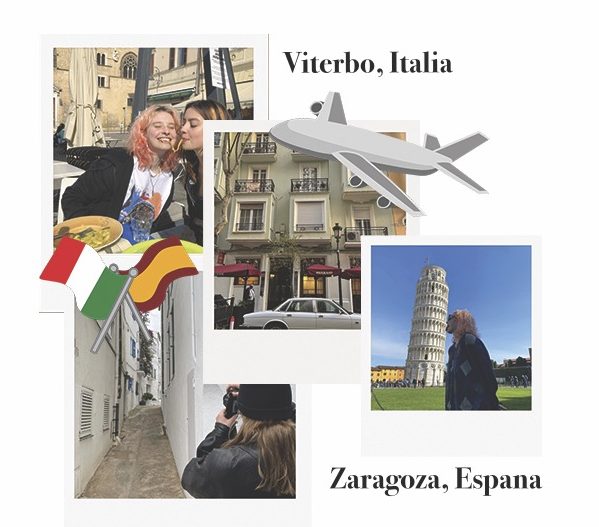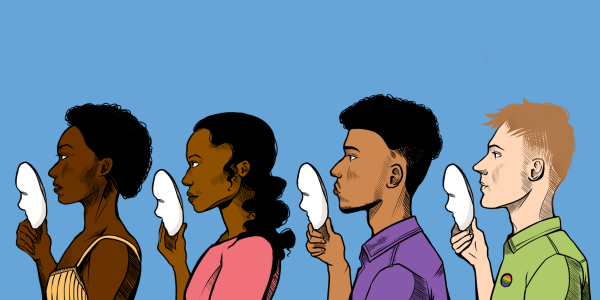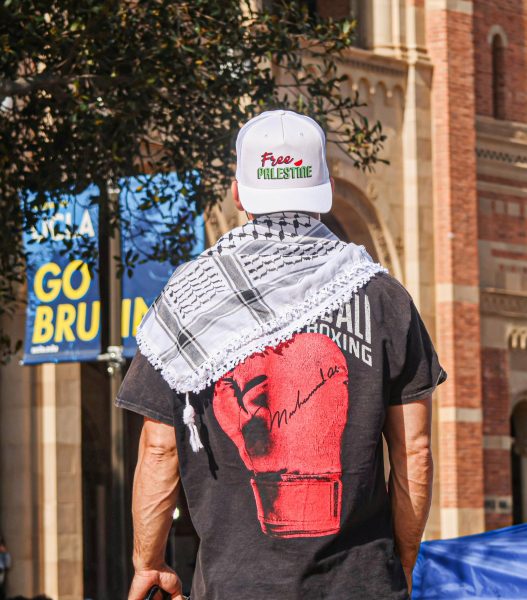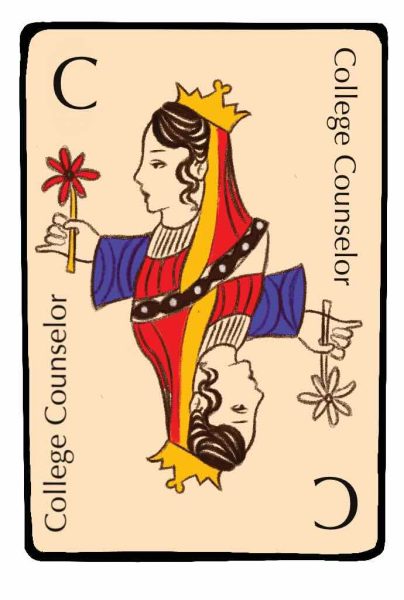Adventures Abroad
Students abroad share their experiences immersing to new cultures while continuing school curriculum in foreign countries.

Illustrated by Alexa Druyanoff
A collage of images from various trips of students to foreign nations.
December 15, 2021
As a bleary-eyed Casey Ross ’23 steps off a train, she stares at a loading Google Maps screen. The display illuminates her face, but she finds herself with no cellular service. It is 2:12 a.m., and three of her peers stand alone beside her in this Naples train station. Faced with a language barrier and no available taxis, they made their attempt to arrive at their hotel 2 miles away.
Ross is currently studying abroad in Viterbo, Italy, fulfilling a year-long program with School Year Abroad (SYA) as she continues her junior year at an SYA-affiliated school while developing language skills in Italian. After taking the Intermediate-Advanced Italian Directed Study course taught by World Languages Teacher Simona Ghirlanda last year, Ross said being immersed in Italian culture has allowed her to gain a new perspective on the language, in real time.
Ross said she tried to familiarize herself with what to expect while abroad by speaking to Ghirlanda, a native Italian. Ghirlanda said she finds many students do not have the same positive cultural experience abroad as Ross because they do not adopt Ross’s open mindset before embarking upon their respective programs.
World Languages Teacher Simona Ghirlanda discusses the Italian program and its relation to studying abroad
“I think I equipped [Ross] to go there with humility, having an open mind and thinking that [Italians] are different [from Americans],” Ghirlanda said. “They like different things, they eat different things, they speak different dialects. [Ross] will have to be flexible, and I think that’s why she’s having a good experience. She went there knowing that she would not be culturally similar to them. [Ross] is there as a student, not a tourist.”
Ghirlanda said in her Intermediate-Advanced Italian Directed Study course, she teaches how cuisine and Italian dialects vary regionally throughout Italy.
“In the class, we talked about [Italian] cuisine, [specifically], about how you can’t have a pizza made in the South and expect it to taste the same as [a pizza] that would be made in Milan,” Ghirlanda said. “I told [Ross] to be ready to eat a lot of pasta daily and not expect to have a large variety of foods to choose from.”
Student abroad in Italy details emerging into Italian culture
Ross said growing accustomed to Viterbo’s cuisine was not as she initially anticipated, but she said studying the language and cuisine has helped immerse herself into the country’s culture.
“I eat more pasta than I had expected but a lot less pizza than expected,” Ross said. “The region of Italy I’m in doesn’t use a lot of salt and typically has unsalted bread. The cultural aspects of Italy that I learned from the directed study [course] helped me integrate into the culture faster because I had a clearer idea of what I would be dealing with,” Ross said. “As a result, I am able to form connections more easily without such a big [language] barrier which makes me simultaneously connect to and with the culture.”
Ross said she has changed her daily routine to adjust to Italy’s cultural norms, and has better acclimated to the pace of the country’s routine.
“I wake up around 6:30 [a.m.], walk to a local coffee shop, and get a cappuccino to start my day before school,” Ross said. “I have school in an old little building where I take English, math, history and Italian courses. I’ll usually end up having free periods during the school day where I can leave school and go do work at a cafe, grab a gelato, or go to a friend’s house while we have a free period together.”
Ross said the SYA program allots four after school hours in students’ weekly schedules for free time to participate in extracurricular activities.
“I found a climbing gym [in Viterbo] which is amazing because that is one of my hobbies back in the U.S.,” Ross said. “I enjoy being able to climb [in Italy] because I have been able to bond with others over a shared interest.”
Student studying abroad in Spain discusses cultural challenges and daily life in Zaragoza
Similarly, Ella Graber ’24, who is enrolled in the SYA program in Zaragoza, Spain, said she has been able to continue to run track and field at a track she frequents from 6 p.m. to 8 p.m. several times a week.
“I miss being able to compete [in track and field] with my peers back in the U.S., but I’m super lucky to be able to continue my sport here in Zaragoza,” Graber said.
Helen Yang ’24 said she became friends with Graber through the school’s track and field program. She said Graber was a natural leader during their sports practices, and she is eager to spend time with her when she returns from Zaragoza, Spain.
“[Graber] is always running ahead of us keeping the pace,” Yang said. “[Graber and I] have made plans to hang out when she returns. I was a new ninth grader and [Graber] introduced me to her friends through the [school’s track and field] program.”
Students Abroad spend time with their host families
Graber said she and her host family enjoy spending time together and watching Spanish television. Host families can include an individual adult, a married couple or a family with children, according to SYA. Graber lives with her host mother and father.
“[My host parents and I] always watch a game show together called ‘Pasapalabra,’” Graber said. “We also watch [‘Money Heist’] in Spanish, which I had watched in English when it first aired”
“We alternate between Italian and American movies [because] switching the opposite subtitles [allows] me to further develop my linguistic skills,” Ross said.
Ross said she goes home to spend time with her host family after climbing. She said living with her host family allows her to experience the familial aspect of Italian culture and the importance of Italian cuisine.
“When I return home, I hang out with my host family for a little while [or] go upstairs to study, but that gets interrupted by insanely long and delicious dinners every night,” Ross said. “I’m not complaining, though. I think my host mom cooks an amazing lasagna. It’s totally insane. I mean, I’ve had lasagna before, but I never really liked it until I got here and tried hers.”
In an interview conducted in Italian, Ross’s host sister Elena Sofia Barelli said being part of the SYA host family program allows her to meet new friends while learning American traditions and culture.
“I pick up new habits when I’m around [my host sister],” Barelli said. “[At school] my friends are always impressed when I know certain American slang phrases [I learn from my host siblings], like ‘coolio.’”
Barelli said she plans on coming to the U.S. either to vacation or to study abroad in a program like Ross’s SYA program.
“I’ve seen how beneficial [the SYA] program is in terms of allowing students to interact with a new culture and language,” Barelli said. “I hope one day I can come visit [Ross] in America and have a similar experience to the one she’s had.”
Barelli said she feels that Ross has become part of her family, and she said she enjoys spending time with Ross whether it be in Viterbo at their home or in town center.
“[Ross] is like a second sister,” Barelli said. “She always makes me smile and happy in every situation. Everyone should have [someone like Ross] in their life.”
Graber said she experiences cultural differences at her host home and around Zaragoza that surprise her on a day-to-day basis. She said despite these differences, people have been willing to help her feel at home in Spain and learn about the country’s culture.
“The first day I got to Spain, my host family yelled at me for taking my shoes off when I entered the house, which was a bit of an experience,” Graber said. “People are much more direct when they speak and when expressing themselves. My host family, peers and people I meet daily are more open about their lives which have helped me develop deeper connections with them.”
Graber said she thought participating in a Spanish immersion program would not be challenging after completing Spanish III in ninth grade. However, she said when she initially met her host family, the language and dialect barrier was greater than she had anticipated.
“When I first arrived [in Zaragoza,] I was very confident that my speaking abilities were going to be enough for my host family to have conversations with me, but for the first week I was there, they couldn’t understand a word I said,” Graber said. “However, with living immersed in another language, language acquisition is almost effortless and your speaking abilities improve very quickly.”








































